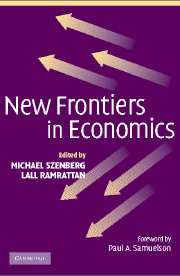Book contents
- Frontmatter
- Contents
- List of Contributors
- Foreword by Paul A. Samuelson
- Preface
- Acknowledgments
- Introduction
- PART I INFORMATIONAL BEHAVIORAL ECONOMICS AND FINANCE
- PART II MACROECONOMICS AND PUBLIC POLICIES
- PART III INTERNATIONAL TRADE AND DEVELOPMENT
- PART IV CONTRACTS, LAW, AND GAMING
- Author Index
- Subject Index
- References
Introduction
Published online by Cambridge University Press: 06 July 2010
- Frontmatter
- Contents
- List of Contributors
- Foreword by Paul A. Samuelson
- Preface
- Acknowledgments
- Introduction
- PART I INFORMATIONAL BEHAVIORAL ECONOMICS AND FINANCE
- PART II MACROECONOMICS AND PUBLIC POLICIES
- PART III INTERNATIONAL TRADE AND DEVELOPMENT
- PART IV CONTRACTS, LAW, AND GAMING
- Author Index
- Subject Index
- References
Summary
A story is told of the poet William Blake's friend, who overheard someone remark that Blake was cracked. The friend's memorable response was, “Yes, but it is the sort of crack that lets in the light!” In this volume, we look at how the younger leading practitioners of the various branches of economics are examining the new directions of the economics discipline in the face of modern economic challenges. This collection of articles represents invention and discovery in the areas of information, trade, development, finance, business, law, gaming, and government as these areas of study evolve through the different phases of the scientific process. Because the authors are presenting new theories that conceptualize reality and values in different ways from their predecessors, some essential background material on methodology will be discussed first.
Thomas Kuhn's description of the scientific process – as modified by Latsis (1976), Lakatos (1977), Laudan (1977), and others – seems to capture the dynamics of change in knowledge represented in this volume. Whereas Kuhn used the term “paradigm shift” to characterize change in the practice of “normal science,” Lakatos used the term “problem shift.” These two classifications also are empirically based in that they ask substantive questions about objects in the domains of their disciplines (Laudan 1977, 15, 77), the concern being fitting theory to facts (Bechtel 1988, 53; De Marchi and Blaug 1991, 2). Another concern of both classifications is how practitioners solve problems.
- Type
- Chapter
- Information
- New Frontiers in Economics , pp. 1 - 24Publisher: Cambridge University PressPrint publication year: 2004



